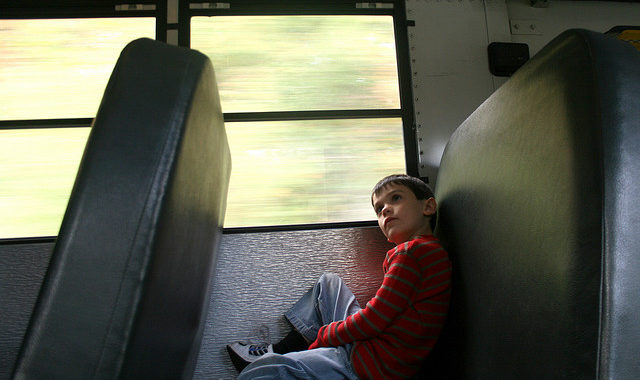Many children anticipate the new school year with excitement and joy as they enter the classroom for the first time or again after a long summer. Others, however, develop a fear of school and parents often struggle with ways to help their children overcome their anxiety about entering the school building. Below are five things parents can do when their children scream or cry in fear when parents announce, “It’s time for school!”
School Is A Big Adjustment
First, it is normal for children to complain about school or even ask to stay home from time to time. Many kindergarteners need a little time to adjust to the routine of school and separating from parents, often for the first time in their little lives. When children persist in their refusal or anxiety about going to school, here are five things you can do:
- Relax and act natural. If you’re anxious to drop off your child, your child will be anxious, too. Keep the good-byes short, sweet, and emotionally neutral. Dramatic departures add to a child’s anxiety.
- Enlist the support of the teacher or school counselor. When you get to school, a school counselor or other staff member can help pry your child away quickly but kindly while you make your casual exit. School counselors can also chat with your child about possible bullying, social, or learning problems that could be contributing to the problem.
- If possible, let another family member or trusted adult friend do the dreaded school drop-off. You say good-bye at home, the other parent or adult friend whisks your child away to the bus or to the car. By the time your child gets to school, he/she has most likely calmed down and is ready to start his/her day.
- Send a small token with your child as a reminder of your love and faith that he/she can get through the day. Your child can keep a special stone or trinket in his/her pocket and touch it whenever anxiety creeps up.
- Reward your child for staying calm and strong during the school drop-off time. Make a chart for each school day. Put a sticker on each day your child cooperates with you and/or stays calm as you take off for school. A special treat is given for every 3 days and build up to every 5 days of calm days. Wean your child off of the reward system after a few weeks.
When To Get Professional Help
If despite using these five interventions, your child’s symptoms continue or worsen, contact a play therapist or child psychologist. These professionals can help identify if your child has a more serious condition such as school phobia, separation anxiety disorder, or social anxiety disorder. They can offer a more comprehensive treatment plan so you and your child can have a more peaceful start to your day.
Ms. Howar d has been the counselor at Oak Grove Primary for five years. She uses play therapy with small groups and individual students currently at Oak Grove Primary. Her specialty is with children ages 3 to 12. Her philosophy involves using techniques such as play therapy to understand children and their challenges through the language of play, the language that children naturally “speak.” Ms. Howard establishes rapport quickly and easily with children using playful interventions that help put them at ease so they can work on their struggles and become happy, healthy kids again. Ms. Howard has received training as a Love and Logic instructor and Child Parent Relationship Training in which she teaches parents how to conduct play therapy sessions with their own children at home.
d has been the counselor at Oak Grove Primary for five years. She uses play therapy with small groups and individual students currently at Oak Grove Primary. Her specialty is with children ages 3 to 12. Her philosophy involves using techniques such as play therapy to understand children and their challenges through the language of play, the language that children naturally “speak.” Ms. Howard establishes rapport quickly and easily with children using playful interventions that help put them at ease so they can work on their struggles and become happy, healthy kids again. Ms. Howard has received training as a Love and Logic instructor and Child Parent Relationship Training in which she teaches parents how to conduct play therapy sessions with their own children at home.



